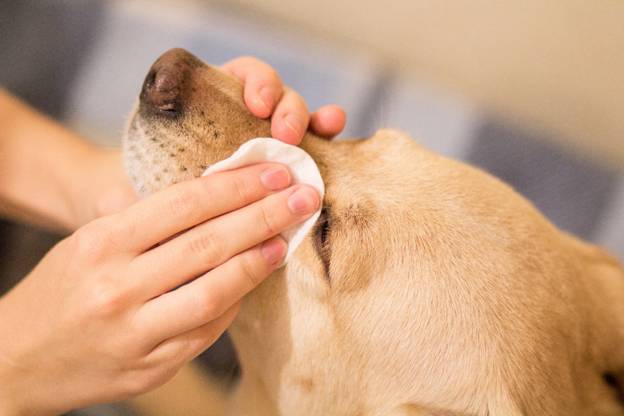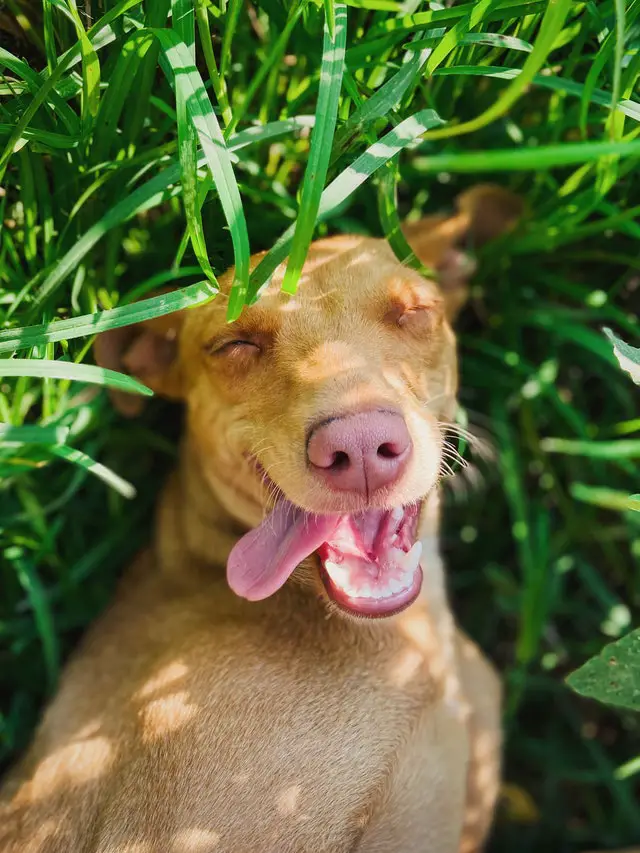Is your dog losing hair around his eyes? Hair loss is a concern for any dog, including a shih tzu or a french bulldog. It’s the same as it is for you humans. As we age, dog hair loss becomes normal as our hair follicles shrink and die.
However, us dogs don’t usually lose hair around our eyes first. You should first start noticing hair loss on our chest, behind our ears, and under our neck. So, losing hair around our eyes may be due to other underlying causes, such as a parasitic skin infection called demodectic mange.
Today, I’ll explain why your dog’s losing hair around his eyes and how you can treat it to help the hair grow back.
Reasons for a Dog Losing Hair Around Eyes
Most of the time, your dog could be losing hair around his eyes because of minor problems such as allergies or fleas. However, sometimes hair loss is an indication of a more serious issue, in which case you need to take your pup to the vet as soon as possible.
To give you an idea of why your dog’s hair loss around the eyes could be happening, I’ve detailed some reasons that this could occur for dogs.
Allergies
We get allergies just like you, and there are a number of allergies that can lead to a dog losing hair around his eyes. Allergies can affect dogs by causing itchy and irritated skin, especially in the mucus membranes on our face, like our mouth, ears, nose, and of course, our eyes.
If you notice your little pup’s eyes start to water, along with a lot of sneezing and a runny nose, he might be experiencing an allergic reaction to something in his environment. This could be seasonal allergic reactions to pollen, or more common reactions to dust, chemicals or food. This can lead to us rubbing our eyes with our paws or anything we may find, resulting in hair loss around our eyes.
I hate to say it, but the best thing to do is to ask your vet for advice. If the allergies are being caused by environmental factors, try and remove whatever is causing the allergy and wash everything. If it’s a food allergy, adjust our diet to try and determine what food we’re allergic to.
Atopic Dermatitis
Atopic dermatitis is an uncomfortable skin condition that is similar to the type of dermatitis that you humans experience. And boy, is it the worst! This condition is caused by food and flea allergies, and the most affected areas are typically the groin, the armpits, and, yes, the eyes.
Symptoms of atopic dermatitis include:
- Hair loss
- Flaky skin
- Itching and scratching
- Rubbing
- Licking
- Redness
If your dog has atopic dermatitis, you’ll notice him constantly scratching himself and rubbing his whole body against the wall.
You have a few options to treat your dog if they are suffering from atopic dermatitis:
- Medication: Immunomodulatory medications will help stop the itchiness. Antibacterial medication can stop any infections that might happen as a result of atopic dermatitis.
- Remove environmental factors: If the condition is the result of environmental conditions such as chemicals or food, remove those conditions and change our diet.
- Shampoo: Use a medicated shampoo to help relieve your dog’s itchiness. I personally love when my owner uses this one!
Conjunctivitis

Conjunctivitis, or pink eye, as you humans call it, is the inflammation of the eye’s lining and tissue, so it’s no surprise that one of the consequences of this condition is losing hair around the eyes. Conjunctivitis can also lead to redness, itching, watery eyes, and puffy eyelids. We begin to lose hair around our eyes because they’re just so irritated, so we can’t stop rubbing them.
There are three types of conjunctivitis:
- Allergic conjunctivitis (not contagious)
- Bacterial conjunctivitis (very contagious)
- Viral conjunctivitis (very contagious)
Treatment depends on what kind of conjunctivitis your little buddy has. An allergic reaction can be cured by simply using eye drops. Bacterial infections are treated with antibiotics. Your vet may also prescribe other types of medication to help your doc get over the infection.
Glaucoma
Glaucoma is as serious of a condition for dogs as it is for humans, and if left untreated, it can cause us to go blind.
Glaucoma is a buildup of fluid in the eye, which results in it looking cloudy. This fluid puts pressure on the eye and will cause improper drainage of the fluids in the eye. Your dog can end up rubbing his eyes a lot because this condition is painful, resulting in hair loss in that area.
If you think your dog has glaucoma, take him to the vet as soon as possible. Your vet will give your dog medications that will help lower the pressure in the eye. In severe cases, surgery may be necessary, and in the worst case, the eye might need to be removed completely.
Ringworm
Thankfully, ringworm does not actually involve a worm! However, it is a highly contagious infection that usually starts with circular hair loss around the eyes. If your dog has ringworm, you might also notice redness, itching, and lesions.
Ringworm can easily spread to other animals through direct contact, even humans! So be careful and quarantine your dog immediately to prevent the spread. If the ringworm is mild, usually it can be cured with a simple skin treatment. But in more severe cases, your vet might give your pup some antifungal medication.
Beware that just because you don’t see any more symptoms, doesn’t mean that the ringworm is completely gone. Bring your dog to the vet one more time so that they can confirm that you’re in the clear.
Fleas
Ah, our worst enemy. Dogs don’t just hate fleas because they’re annoying, but they can also be very harmful to us.
Fleas are tiny black or brown parasites that can trigger an allergic reaction through their bites and saliva. You’ll more often find them on our ears and tail, but these tiny parasites don’t discriminate, and you can find them all over us. Although they don’t usually hang out on our face, the infection that they can cause might travel around our face.
Flea problems can usually be fixed at home, using pills, chewables, treatments, and shampoos. However, if your dog has a severe flea infestation, your veterinarian may prescribe something stronger. Make sure that you clean everything that your dog has been lying on to make sure that all of the fleas are gone!
Infections

There are a number of infections, fungal, and bacterial problems that can be caused by parasites such as fleas, ticks, and mites. These infections can cause skin irritation and lead to your dog rubbing his eyes.
If you think your dog has an infection, take him to the vet so that they can diagnose him and recommend the proper treatment.
Taking Care of Your Dog’s Eyes
I hope you have a better idea of what it means when your dog loses hair around his eyes, and how you should go about treating it. If you recognize the problem early, you’ll save your best friend a lot of discomfort and keep him healthy!